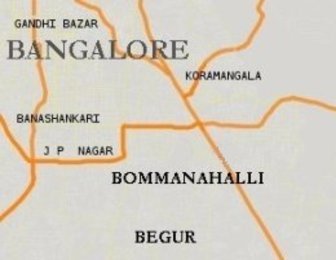
Monsoon worries once again
Seven months after last year's disastrous flooding finally ended, residents in low-lying areas southeast of Bangalore
are anxious what this year's monsoon rains will bring. With city authorities yet to tackle the infrastructure problems
of the area, many can do little more than hope.
Padmalatha Ravi
reports.

Farmers' win in court boosts morale
Two farmers from Chamarajanagar, Karnataka, took the state
government to court for not giving them water for the past
three-four years. The twist is that they approached a district consumer
court, and won the case in less than a year.
Veena N
reports.
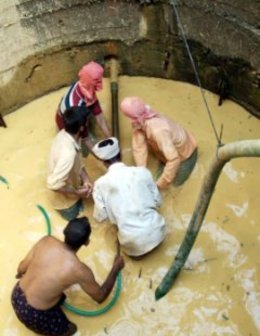
Don't dig down
In a twist to the usual practice of digging deep bore wells in search of water, Mohammad decided to try scouring
for water horizontally. His success at this unusual method has earned him the nickname 'adda-bore', and many satisfied
clients.
Shree Padre
reports.
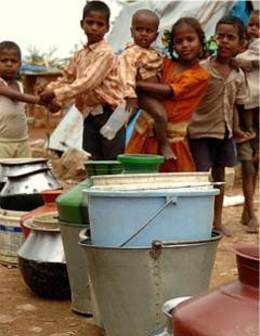
Selling piped water or pipe dreams?
The Greater Bangalore Water Supply and Sanitation Project aims to supply
piped water to 8 townships on the outskirts of Bangalore, boldly
proposing to unhook citizens there from reliance on tubewells, borewells
and water tankers. Yet, the only certainty in the much debated project is
that the waters are murky, muddy and unclear.
Arati Rao
reports.
Minimised by the law
Neither the protections of law nor interventions by the Supreme Court have ensured adequate minimum wages
for the jobs performed by tens of millions of unorganised workers.
Kathyayini Chamaraj
reports on a recent survey by a Bangalore-based group showing how far below fair standards these workers have been pushed.

Harvesting success in a troubled region
The area around the Nagavalli tank in Tumkur, Karnataka has been reeling under water scarcity for the
past several years, with extensive sinking of bore wells not helping. But Jaya farm, owned by
75 year-old Jayanna and run by his middle-aged son Kumara Swamy, has become a ray of hope and self-help.
Shree Padre
reports.
A divided city
The line between cultural assertion and chauvinism is a very thin one. The demand for renaming
Bangalore, part of the unfinished business of linguistic nationalism, is legitimate, and should be honoured.
However, Kannada pride should not lead to Kannada chauvinism, writes
Ramachandra Guha.
The sum of broken parts
Should Bangalore and its surrounding municipalities be merged into a single jurisdiction, as the state's politicians
are now proposing to do? The Constitutional standard as well as Bangalore's abysmal record of administering even the
core metropolis both argue against centralisation.
The India Together editorial.
Envisioning a different city
All the steel and glass towers of the glitzy facade of Bangalore cannot hide its seamy underbelly where
life is pieced together under plastic tents, with fear and want as constant companions. The Bangalore
Social Forum that came into existence on Independence Day believes that another Bangalore is possible,"
writes
Kathyayini Chamaraj.
Kudremukha mining: closure in sight?
On 31 December 2005, the curtains are set to come down on the Kudremukh Iron Ore Company Ltd's
long disputed mining operations in the protected Kudremukh National Park. But ensuring an end to
mining in one of the most stunning landscapes of the country has not been easy.
Pavithra Sankaran
provides a telling narrative.
Kudremukha mining: closure in sight?
On 31 December 2005, the curtains are set to come down on the Kudremukh Iron Ore Company Ltd's
long disputed mining operations in the protected Kudremukh National Park. But ensuring an end to
mining in one of the most stunning landscapes of the country has not been easy.
Pavithra Sankaran
provides a telling narrative.
Bangalore: Whither the future?
Talk of the city's future is a lament over failing infrastructure, encroachments, and neglected
millions. Civic-minded citizens are critical of the latest Comprehensive Development Plan, and point to its
legal flaws, mismanaged process for citizen inputs, and misplaced priorities.
Arati Rao
reports.
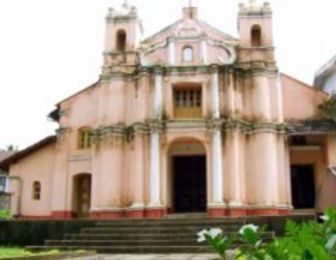
Faithfully harvesting the rain
Rainwater harvesting isn't just for drought-prone regions, nor is it an entirely recent development.
Shree Padre
travels to an old church in Dakshina Kannada district, where despite living in one of the rainiest places in the nation,
monks put up a roof water harvester many decades ago, and maintain it to this day.
Cutting through the urban jungle
It may take more than random coverage of dramatic developments on the civic front for the media
fulfil its promise of connecting citizens and governments. Mere reports based entirely on press
statements and conferences in which plans are presented with little questioning
won't do, writes
Ammu Joseph.
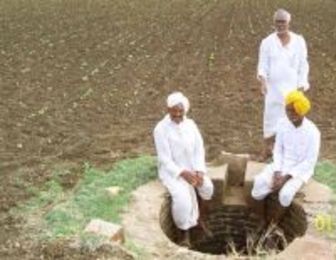
Drought-proofed by traditional wisdom
Three generations of a farming family in Bagalkot district in Karnataka campaigned to drought-proof the fields
and to conserve the soil and water.
Their inspiration was a 170-year old book that until recently remained only in manuscript form.
Shree Padre
reports on the enviable results.
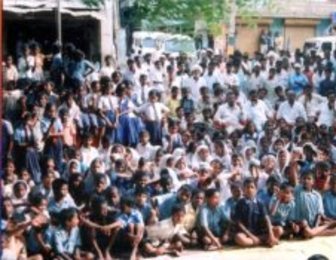
Water procession brings mindset change
A Karnataka district that has been reeling under three successive years of
drought may be bouncing back. The state government's top bureaucrat in Bagalkote
district led civil society groups in a water harvesting campaign between 16-27 June, just as
the monsoon rains had begun.
Shree Padre
reports.
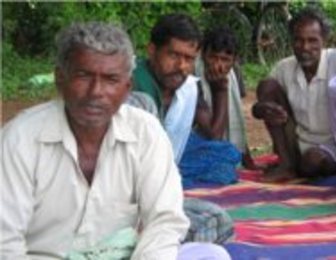
1000 year-old tradition keeps them together
Residents of seven villages in Kolar district depend on water from the Mudiyanur tank which
is not in good shape and in need of de-silting. Still, the villagers' worship of goddess
Chowdeswari has helped them preserve an age-old tradition of water allocation, finds
Surekha Sule.
Karnataka's RTI experience for the better
A citizens forum at Bangalore has been spearheading interventions using the Karnataka Right to Information Act
for the past year. The Katte members' focus has helped expose the law's weaknesses and make recommendations to better the recently passed Central Right to Information Bill.
Kathyayini Chamaraj
reports.
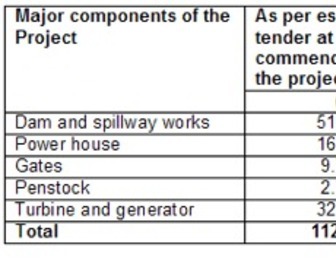
Cracks in the CAG's scanners
The Comptroller and Auditor General of India is the nation's supreme audit
institution. It is widely respected for its unshaken independence in
auditing government expenditure. But in its scrutiny of Karnataka's Gerusoppa dam,
it let off the Karnataka Power Corporation on two key counts.
Himanshu Upadhyaya
interprets the CAG's 2004 report.
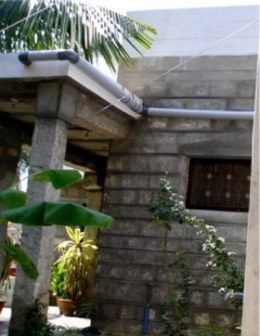
Karnataka inches forward in water harvesting
Water table reports in Karnataka show that the future looks bleak. While rainwater harvesting (RWH) is looked upon as a viable solution and has become a buzzword, the state has only taken an incremental implementation path, with urban areas currently leading rural areas, reports
Padmalatha Ravi.

Rain barrels catalyse water harvesting
The potential of rainwater harvesting has been much talked about in recent times. But
that an ordinary plastic water storage drum connected to the roof through a pipe will
turn this potential to reality is surprising many citizens in the Bangalore-Mysore region,
reports
Shree Padre.
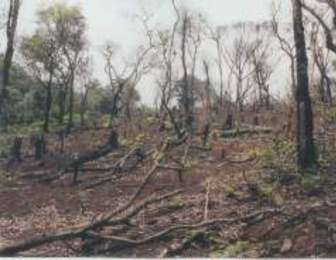
Bhimgad awaits justice
Illegal felling, mining, and conversion of forest land into non-forest uses, have all been unchecked here. Repeated
hearings in the Supreme Court were ignored by forest
officials.
Kanchi Kohli
reports that the case presents both new opportunities for holistic conservation as well as risk of the Court's orders
being flouted brazenly.
Urban services: Too many cooks
There is no overlap between the administrative jurisdictions of various city agencies, or congruence with political boundaries. The
result: the citizen is confused, the local politician is confused, the agency representatives are confused.
Ramesh Ramanathan
calls for a transformation of this chaotic situation.

Bangalore airport: real estate or runway?
True, Bangalore must be able to handle more flights, passengers and air freight to meet current
demand and future growth. But Londons Heathrow airport sits on 1000 acres less land, and yet
flies 14 times more passengers than Bangalore's new airport will. What's going on?
Jacob John investigates.
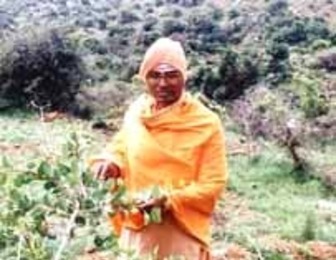
Rejuvenation of a hill range
Hit by metal mining and tree cutting, the Kapotagiri hill range in Karnataka was turning barren. But in the
last year, a local seer has worked with forest officials to bring back some of the green glory, reports
Shivaram Pailoor.
Parents' oversight in schools stalled
The pressing need for direct participation of citizens in public
oversight has always contrasted
with the eagerness
of political parties to penetrate virtually all public offices. In Karnataka,
school development monitoring committees were the latest to fall victim to this imbalance.
Subramaniam Vincent
reports.
Revamping municipal delivery systems
The Bangalore based technology non-profit, eGovernments Foundation has recently
been in the news for expanding its municipal systems reform operations
to New Delhi. Managing Trustee
Srikanth Nadhamuni
talks to Subramaniam Vincent.

How fire-safe are our schools?
The majority of civil fire incidents happen due to lack of clear laws and a blatant disregard for existing rules and regulations, assert
Harminder Kaur and Bhargavi S Rao.
The authors look at the Karnataka situation.
One step forward, two steps back
Subramaniam Vincent
follows the intrigue, as New Delhi seeks to weaken Right to Information
laws on the one hand, and receives a proposal to strengthen RTI at the
same time.
The pressure for accountability
Citizens and government are thinking differently about each
other on access to information, notes
Subramaniam Vincent.
The Central law in the next challenge.
The electoral roll farce
Kathyayini Chamaraj
reports on one of the most critical predicaments of the Indian elections process.
A deeply flawed voter registration system.
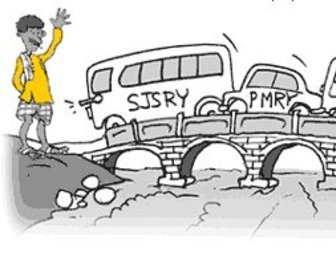
Janaagraha spreads out
With many of its regular programmes running smoothly, Bangalore's
pioneering civil society organisation turns to newer ways of
engaging citizens.
Rasika Dhavse
reports.
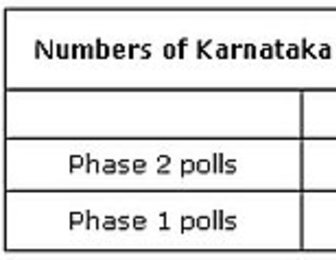
Could these candidates be lawmakers?
The
Karnataka Election Watch Committee
collected an enormous amount of data about candidates as the state
went into Assembly and Lok Sabha polls late last month. A brief report.
Land, law and planning
Jacob John
reviews Of Master Plans, Laws and Illegalities in an Era of Transition, a report prepared by the Alternate Law Forum for the Bangalore Development Authority.
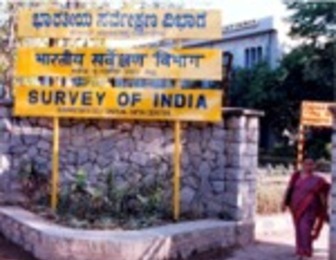
A new property map for Karnataka
Subramaniam Vincent
profiles eGovernments Foundation's partnership with Karnataka to create
better property-tracking systems, and notes the early gains for the state.
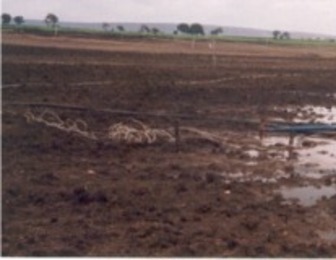
Diverting a river, west to east
Karnataka's state government proposes to divert the waters of the Goa bound Mahadayi river
back into the Malaprabha river to counter acute water scarcity.
Kanchi Kohli
digs deeper.
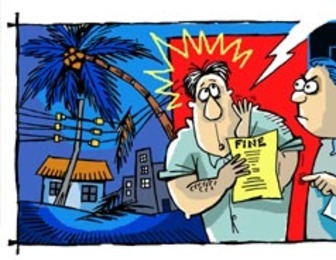
A surge for consumer rights
Karnataka's Electricity Regulatory Commission reminds Bangalore's
power supplier it has an obligation to provide reliable and
safe service.
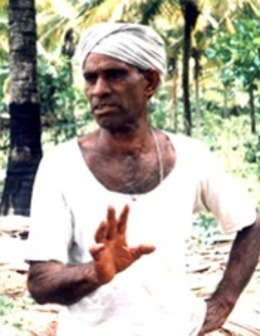
35 acres, organic and profitable
Anitha Pailoor
profiles a large landholding family farm in Karnataka's Hassan district
that switched from chemical farming to organic in the mid-nineties.

A collective enterprise
As 2003 draws to a close,
Rasika Dhavse
reports on Janaagraha, a Bangalore's citizens platform for participative
local democracy.

Systems for better governance
India Together interviews Srikanth Nadhamuni of Bangalore's eGovernments Foundation.
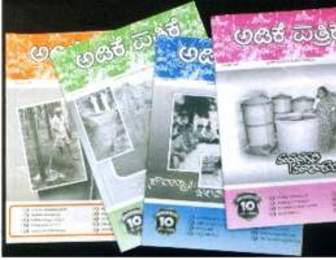
This journalism is about growing
Shree Padre
delves into the details of a unique, successful experiment of self-help farm journalism.
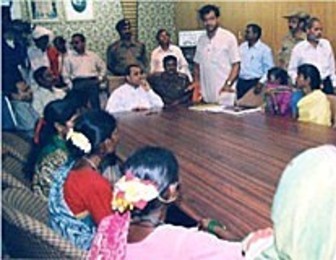
Kali polluter held accountable
Karnataka's West Coast Paper Mill had to deal with much more than shareholders on the day of its recent Annual General Meeting.
Ending municipal water shortages
Incorporating a financial structure that allows stakeholders to hold each other accountable in their balance of interests can make municipal water supply a win-win for everyone, says
Jacob John.
A progressive law for local planning
A new legislation aims to bring in a rigorous process of planning, transparency and citizen participation together at the local level in Karnataka, says
Vinay Baindur.
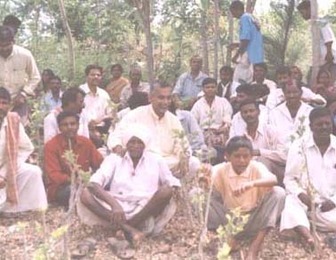
Electronic land
Karnataka's best bid at electronic governance is targeting land records, says
Keya Acharya.
K R Puram's local elections
A township on the eastern outskirts of Bangalore was among the first to run into council elections after the Supreme Court ruled on new disclosure rules for candiates.
Public Affairs Centre
looks at whether candidates and officials actually followed due process.
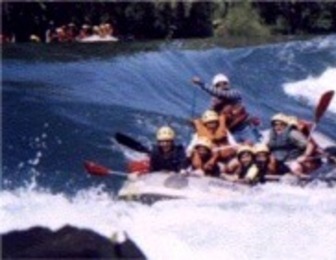
Seventh Kali dam shelved
A proposal for the last dam on Karnataka's Kali river has been abandoned, says the state's Industries Minister R.V.Deshpande. The state's apex environmental regulator makes several forward-looking promises.
Networked ponds transform drylands
N G Hegde
on a Karnataka water project that is more than an innovation making water and irrigation a reality in a drought-prone area.